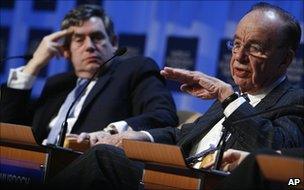Is a wedding a meeting? What about a slumber party?
- Published
- comments

In May 2010 David Cameron met Rupert Murdoch for what Downing Street calls a "general meeting".
That is on the list of prime ministerial meetings, external already routinely revealed by the government.
Mr Cameron has now promised there will be a new era of greater transparency for the relationship between politicians and the media.
Yet, as with many aspects of this complex, rapidly changing business, the eventual implications of this pledge are far from clear.
The prime minister told the House of Commons yesterday, external that he wanted ministers to record and publish "all meetings with newspaper and other media proprietors, senior editors and executives - regardless of the nature of the meeting".
This would be achieved by amending the ministerial code, external which governs the conduct of government ministers.
The information will then be published quarterly. The same will also apply to special advisers and permanent secretaries. And he added helpfully: "The Opposition might also want to adopt this practice to ensure a cross-party approach."
If fully pursued this would have a wide-ranging impact. It goes well beyond the current disclosure regime and in some respects beyond what happens under the Freedom of Information Act.
Working lunch
Under the ministerial code as it stands, ministers must reveal meetings with external organisations. Details are issued on a quarterly basis, external, although it looks to me as if the latest publicly available records cover December 2010, which doesn't seem fully in the spirit of transparency.

Some meetings are more publlic than others
This will tell you not only about the Cameron-Murdoch meeting in May 2010, but that other people he met formally last year included Bill Gates, Bob Geldof, Nick Ross and Brooke Kinsella.
Details of hospitality received by ministers' special advisers are also disclosed already. You can see that some of this appears to include being bought lunch by media organisations (including the BBC).
The method of disclosure in numerous separate files makes it a rather time-consuming and tedious business to compile a comprehensive overview across government over a long period, but the material is there.
David Cameron's pledge would go further than this by including all meetings (not just hospitality) for special advisers and - significantly - by also covering permanent secretaries, the top grade of the civil service.
Slumber party
However you could request this currently under the Freedom of Information Act. Where the new policy may go beyond FOI is through the phrase "regardless of the nature of the meeting", if that is interpreted rigorously.
This is because freedom of information applications may be turned down (as I know from experience) when they relate to meetings which are considered to be informal, private, social or party political, rather than formal meetings on government business of which some record is held.
So will we now be told about every wedding, "slumber party, external" and other social gatherings at which ministers and media executives mix?
Or does going to someone's wedding not count as a "meeting"?
Or what if the meeting is with a near-neighbour in, say, Chipping Norton and you pop round one day over Christmas for a bite of lunch - is that a "meeting"?
Uneasy question
In other words we don't yet know how much further transparency this will all bring to the tricky relationship between politicians and the media. That will depend very much on how many of the terms in the prime minister's statement are to be interpreted:
Will it be strictly "regardless of the nature of the meeting"?
How long does a conversation have to be before it becomes a "meeting"?
In this age of new media, who exactly is a "proprietor"?
And, for many journalists, one important and possibly uneasy question will be: Who is a "senior editor"?
Working journalists who frequently meet ministers and special advisers - and even occasionally permanent secretaries - in all sorts of formal and informal contexts may be wondering about that now.
If implemented this will take the disclosure of politician-media relations well beyond that required for any other industry. But then the media does play a very special role.
And as yet there is no suggestion that the full content of the conversation will be automatically disclosed - now that really would take transparency to a very different level.